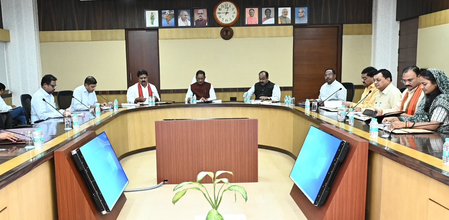

Raipur, June 30 (IANS) In a series of sweeping policy decisions aimed at bolstering agriculture, governance, and economic infrastructure, the Chhattisgarh Council of Ministers on Monday approved several key proposals, including two important bills and a redevelopment scheme, during a cabinet meeting chaired by Chief Minister Vishnu Deo Sai.
Among the most significant announcements was the expansion of the Krishak Unnati Yojana. Previously limited to providing input assistance to paddy farmers, the scheme will now also benefit those cultivating pulses, oilseeds, and maize in Kharif 2025.
“Registered farmers who had grown and sold paddy at the minimum support price in Kharif 2024 will also be eligible for assistance if they switch to these alternative crops. The move is expected to encourage crop diversification and reduce the state’s overdependence on paddy cultivation,” said Deputy Chief Minister Arun Sao.
The Chhattisgarh “Krishak Unnati Yojana,” launched in March 2024, is a flagship agricultural welfare programme aimed at increasing farmers’ incomes and promoting sustainable crop diversification. It was introduced in response to challenges faced by more than 70 per cent of the state’s population reliant on agriculture, particularly income instability due to erratic weather and rising input costs.
At its core, the scheme offers input assistance to registered farmers who cultivate paddy and sell it at the minimum support price (MSP). For Kharif 2023, the government provided Rs 19,257 per acre as support.
The scheme is implemented by the State Co-operative Marketing Federation Limited (MARKFED), with the Food Department overseeing procurement operations through co-operative societies. In another step towards fiscal sustainability, the cabinet approved the draft Chhattisgarh Pension Fund Bill-2025.
“The fund aims to ensure better financial management of future pension liabilities for state government employees. Chhattisgarh is poised to become the first state in India to legislate such a fund, reflecting a proactive approach to long-term financial planning,” the Deputy Chief Minister added.
To further reinforce economic resilience, the cabinet also cleared the draft of the Chhattisgarh Growth and Stability Fund Bill-2025. The fund will manage fluctuations in state revenue and serve as a financial buffer during economic downturns.
It is designed to promote stabilisation by addressing revenue shortfalls caused by slowdowns, natural disasters, or other unforeseen events. During periods of high growth, surplus revenues can be allocated to the fund to sustain public investment and welfare programmes in lean years.
Institutionalising savings in this manner also supports fiscal discipline and reduces over-reliance on borrowing. This initiative aligns with broader fiscal reforms introduced in the 2025–26 Budget, including the Chhattisgarh Pension Fund Bill-2025 and increased capital expenditure on infrastructure and digital governance.
As part of its strategy to establish Chhattisgarh as a logistics hub, the cabinet approved the Chhattisgarh State Logistics Policy-2025.
“The policy envisions leveraging the state’s strategic location to attract national and multinational investments. It includes provisions for the development of dry ports, inland container depots, and improved storage infrastructure to benefit industries, traders, and farmers. The policy is also expected to create significant employment opportunities and boost exports of forest produce and medicinal products,” said the Deputy Chief Minister.
Additionally, the Cabinet approved the Chhattisgarh Jan Vishwas (Amendment of Provisions) Bill-2025, intended to decriminalise minor infractions under state laws. The bill is expected to reduce litigation and enhance the ease of doing business.
Under the Redevelopment Scheme, seven projects were approved to revitalise dilapidated government buildings and unused land. These include locations such as Shanti Nagar and BTI Shankar Nagar in Raipur, Kailash Nagar in Rajnandgaon, and Chandni Chowk Phase-2 in Jagdalpur.
In a one-time relaxation, the Cabinet also reduced the minimum qualifying service for promotion from high-class registration clerk or record keeper to third-class executive sub-registrar under the Commercial Tax (Registration) Department, from five years to two, in order to accelerate career progression for eligible staff.
–IANS
sktr/dan
